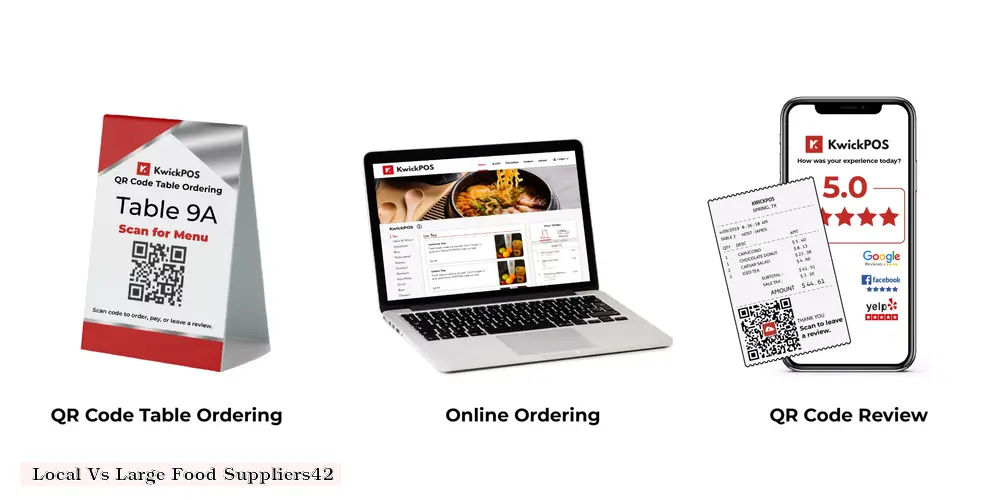

The food supply chain is a critical component of the restaurant industry, and the decision to partner with local or large-scale food suppliers can significantly impact a restaurant's bottom line, as well as its reputation and relationship with customers. This analysis will examine the benefits and drawbacks of both local and large-scale food suppliers in the context of the restaurant business.
Local Food Suppliers:
Local food suppliers are often small-scale producers, such as family farms and artisanal food makers, that operate within a relatively small geographic area. They may provide a range of products, including fresh produce, dairy, meats, and specialty items.
Benefits of Local Food Suppliers:
1. Freshness: Local food suppliers often provide fresher ingredients, as the time between harvest and delivery is shorter than with large-scale producers.
2. Sustainability: Supporting local food systems can help reduce the carbon footprint associated with long-distance transportation of food.
3. Traceability: It is easier to track the origin and quality of locally sourced ingredients, as the supply chain is shorter and more transparent.
4. Community Connection: Partnering with local food suppliers can help restaurants establish a unique identity and connect with the local community.
Drawbacks of Local Food Suppliers:
1. Limited Selection: Local food suppliers may not offer the same variety or volume of products as large-scale producers.
2. Inconsistent Supply: Weather conditions and other factors can impact the availability of locally sourced ingredients.
3. Higher Costs: Local food suppliers may have higher prices due to smaller production scales and the costs associated with meeting regulatory requirements.
Large-Scale Food Suppliers:
Large-scale food suppliers are typically large corporations that produce and distribute food products on a massive scale. They may offer a wide variety of ingredients at competitive prices.
Benefits of Large-Scale Food Suppliers:
1. Consistency: Large-scale food suppliers can provide a consistent supply of ingredients, regardless of season or location.
2. Cost-Effective: Large-scale food suppliers can offer competitive prices due to economies of scale and efficient distribution networks.
3. Variety: Large-scale food suppliers often have a wider range of products, including specialty and hard-to-find ingredients.
4. Compliance: Large-scale food suppliers are more likely to have the resources and expertise to comply with food safety regulations and industry standards.
Drawbacks of Large-Scale Food Suppliers:
1. Lack of Freshness: Ingredients from large-scale food suppliers may have been stored or transported for longer periods, potentially impacting freshness and quality.
2. Environmental Impact: The transportation and production processes associated with large-scale food suppliers can contribute significantly to greenhouse gas emissions.
3. Less Transparency: The complexity of large-scale supply chains can make it challenging to trace the origin and quality of ingredients.
4. Reduced Community Connection: Restaurants that rely solely on large-scale food suppliers may miss out on opportunities to connect with local communities and support smaller producers.
In conclusion, the decision to partner with local or large-scale food suppliers depends on a variety of factors, including a restaurant's operational needs, values, and target market. Restaurants may find that a balanced approach, incorporating elements from both local and large-scale food suppliers, can provide the best outcome in terms of quality, cost, and community impact.
Regardless of the chosen path, it is crucial for restaurants to maintain transparency in their sourcing practices and to continuously evaluate the impact of their decisions on their business and the communities they serve.
DISCLAIMER: This information is provided for general informational purposes only, and publication does not constitute an endorsement. Kwick365 does not warrant the accuracy or completeness of any information, text, graphics, links, or other items contained within this content. Kwick365 does not guarantee you will achieve any specific results if you follow any advice herein. It may be advisable for you to consult with a professional such as a lawyer, accountant, or business advisor for advice specific to your situation.
today
Copyright © 2026 Kwick365.com
Designed by KwickPOS is the best restaurant POS